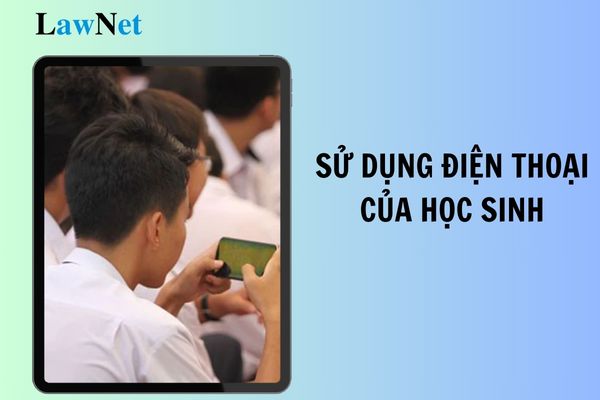What are the sample paragraphs on the use of mobile phones by students in Vietnam? When are 9th-grade students in Vietnam allowed to use mobile phones during class?
What are the sample paragraphs on the use of mobile phones by students in Vietnam?
Students can refer to the following sample paragraphs on the use of mobile phones by students in Vietnam:
Sample 1
| Nowadays, smartphones have become an indispensable part of students' lives. Thanks to phones, students can quickly search for information and connect with friends and teachers via educational apps. However, the use of phones also poses several issues. Firstly, many students can be easily distracted by games, social media, or messages, leading to neglecting studies and not achieving desired academic results. Some even stay up late surfing their phones, affecting their health and mental state. Additionally, excessive phone use can reduce students' ability to communicate directly with people, thereby losing important social skills. Furthermore, when exposed too much to inappropriate content on the internet, students may encounter negative impacts on their psychology and behavior. Therefore, phone use needs reasonable control. Students should know how to balance their time between studying, playing, and using phones to protect their health and develop comprehensively. |
Sample 2
| Smartphones today have become an important tool for learning and entertainment for students. However, excessive phone use can lead to many issues, particularly affecting health. One serious problem is its impact on the eyes. Looking at phone screens for long periods causes eyestrain, dry eyes, and even myopia. Students often use phones to surf the web, watch movies, or play games, especially at night, preventing the eyes from resting, thus increasing the risk of eye diseases. Moreover, staying up late to use phones also affects sleep quality, causing fatigue and reduced concentration during studies. Therefore, to protect eye health and maintain good academic results, students need to use phones reasonably, limit screen time, and remember to take regular breaks. |
Sample 3
| Today, smartphones are an important tool that helps students connect with friends, teachers, and provide useful information. However, excessive phone use can have negative impacts, particularly creating distance from those around them and society. When spending too much time on social media, playing games, or watching videos, they easily overlook direct conversations with family and friends. This leads to a lack of communication, reducing the ability to build real relationships, as well as social skills. Students may become lonely, less involved in group activities, and lack the ability to handle communication situations in daily life. Even when sitting with family or friends, they remain engrossed in their phones, ignoring those around them, making relationships colder. Therefore, phone use needs to be adjusted reasonably so that students do not lose the ability to connect with people and maintain good social relationships. |
Sample 4
| Currently, smartphones have become an indispensable part of students' lives. Although they offer many conveniences, excessive phone use also bears several risks, especially the threat of online scams. By participating in social networks, texting, or online shopping, students can easily become targets for scammers who try to exploit their lack of knowledge and experience. Online scams such as impersonating acquaintances, pretending to be reputable organizations, or tricking students into participating in prize programs often trap them. Without caution, students may have their personal information and accounts stolen or even lose money. Therefore, to avoid these risks, students must always be vigilant, only share personal information on trustworthy platforms, and learn to recognize scam signs. |
Note: The content is for reference only!

What are the sample paragraphs on the use of mobile phones by students in Vietnam? When are 9th-grade students in Vietnam allowed to use mobile phones during class? (Image from the Internet)
When are 9th-grade students in Vietnam allowed to use mobile phones during class?
Under Article 37 of the lower secondary school, upper secondary school and multi-level school charter promulgated with Circular 32/2020/TT-BGDDT:
Prohibited acts for students
1. Disrespect the dignity, honor or bodily integrity of teachers, officials and staff of their schools, other people and other students.
2. Act dishonestly in learning, examinations or admission process.
3. Buy, sell or use alcohol, tobacco, drugs, other stimulants, firecrackers or explosives.
4. Use mobile phones and other devices in class for purposes other than learning and without the teacher's permission.
5. Fight or disrupt public or school order or security.
6. Use or exchange cultural products that incite violence or contain indecent materials; use toys or play games that impede their own healthy development.
7. Students shall not commit other prohibited acts provided for by regulations of law.
Thus, 9th-grade students in Vietnam can use mobile phones during class to serve learning purposes with the teacher's permission.
May the schools in Vietnam confiscate students' mobile phones?
Under Article 38 of the lower secondary school, upper secondary school and multi-level school charter promulgated with Circular 32/2020/TT-BGDDT:
Reward and discipline
...
2. Students making a mistake during the learning and training process shall be corrected or disciplined in the following ways:
a) Give the student a reminder, directly support them in correcting their mistake.
b) Reprimand the student, inform the student’s parent(s) to have the parent(s) cooperate in supporting the student in correcting their mistake.
c) Suspend the student’s study at school for a definite period and take other correcting measures according to regulations from the Ministry of Education and Training.
Confiscating students' mobile phones is not among the disciplinary measures forms permitted by law. Therefore, the school is not allowed to confiscate students' phones.

